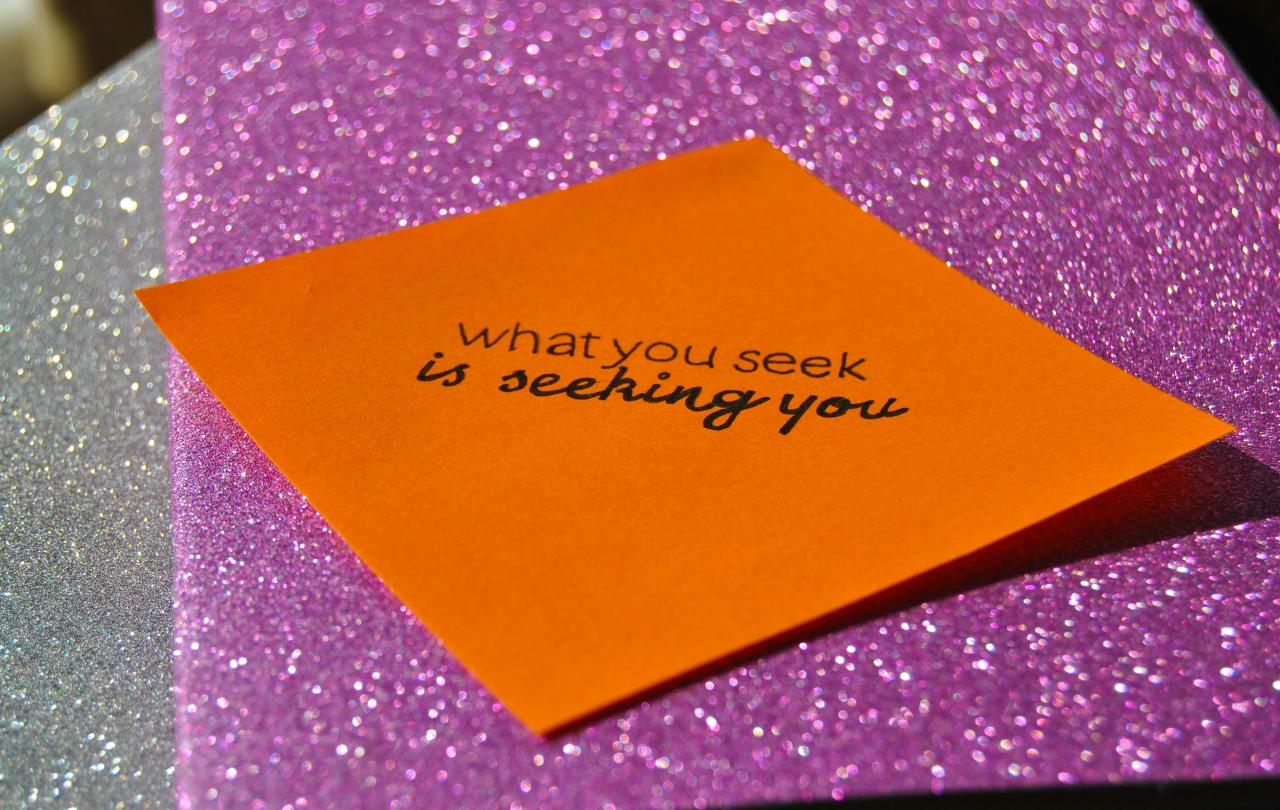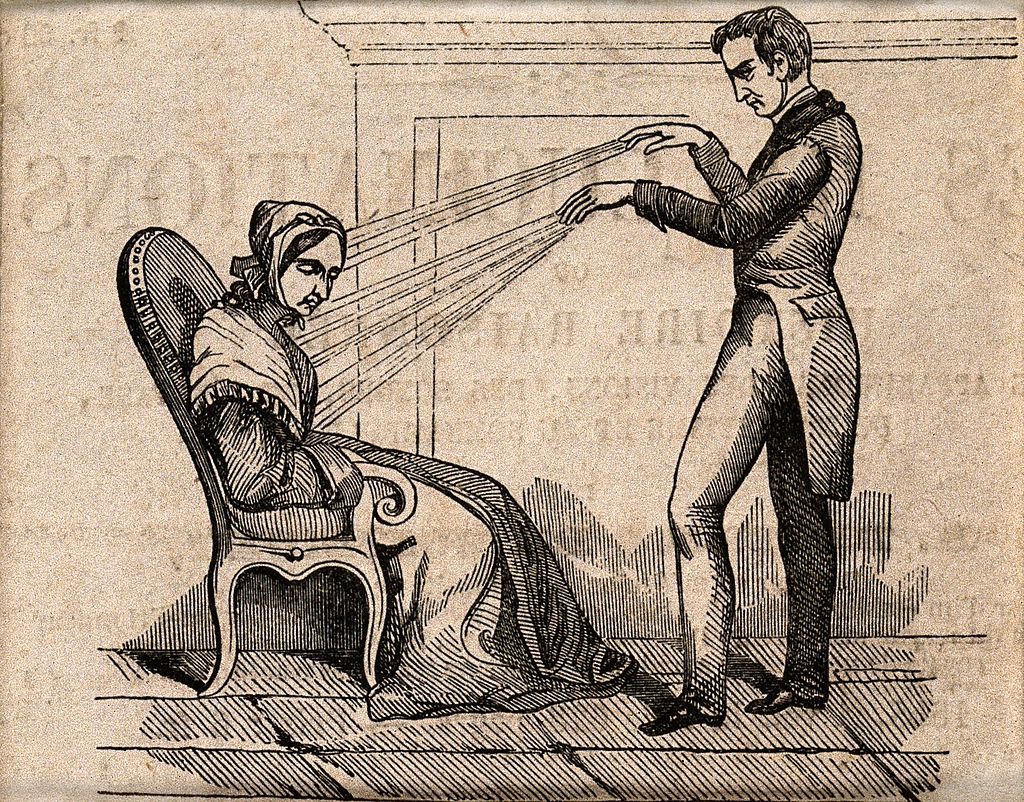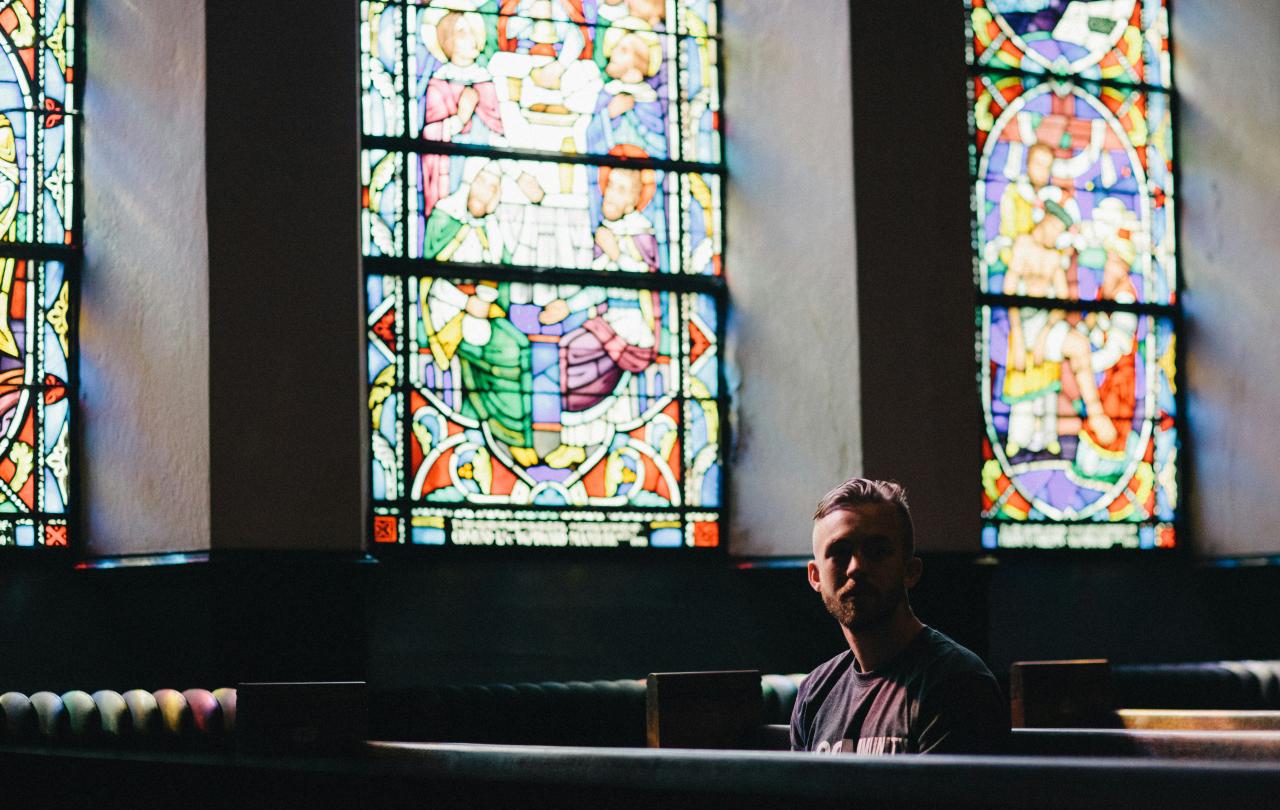
I’m slightly late to the party, but you may have heard that the Cambridge 2024 Word of the Year was ‘Manifest’. Essentially, ‘To Manifest’, according to our friends at Cambridge, is ‘to imagine achieving something you want, in the belief that doing so will make it more likely to happen’. For many people, ‘manifesting’ belongs in the eye-browraising intellectual funfair of New Age spirituality and self-help gurus and charlatans whose books belong in the second-hand boxes outside shops on the high street of dilapidated coastal towns selling crystals.
If you’re a Gen Xer and elder Millennial, you’ll probably have heard of Rhonda Byrne’s The Secret, a 2006 self-help hit. She claimed to teach readers the secret to prosperity, self-realisation, and fulfilling your heart’s desires. Visualise the object of your desire in your mind, use the innate concentrative energy of your cognition, and, through the scientific Law of Attraction, the Universe (yes, the capital ‘U’, Universe) will deliver unto you those things which you have brought into your mind because ‘like attracts like’. It shares a very similar perspective to a book written a hundred years prior in 1910 called The Science of Getting Rich by William Wattles which, again, claimed that through ‘creative thought’ you could achieve financial success. By ‘creative thought’ Wattle didn’t mean coming up with a growth strategy for your personal finances - he meant, like Bryne, that there was a psychical force in the Universe that you could tap into with your mind which could manifest, in reality, your thoughts and desires.
Again, if you’re a child of sensible society, you probably would have dismissed all of this as pseudoscientific New Age wishful thinking intended to make bad authors rich. Or, if you were more generous, you might have said that these were helpful psychological practices like ‘focusing on your goals’ encoded in woo-hoo New Age language. It belongs in the weird corner of society. And so, you might be somewhat baffled to find it breaking through into mainstream society - so much so that a sensible institution, like Cambridge University, would highlight it as a groundswell trend in the twenty-first century.
But is this really a surprise? What has sensible society given us? For many, it’s been the managed and catastrophic decline into societal disillusionment, a generation of broken promises, and the feeling of being feudal serfs under the dominion of national banks and billionaires while we medicate ourselves to death with algorithmically-driven AI slop in the spiritual vacuum of a fragmented and polarised society. The fact that the Oxford Dictionary's Word of the Year was ‘brainrot' makes this all the more ironic and sad. And so is it any wonder that people are looking beyond the sensible towards the magical, the mystical, and the Esoteric? And I’m using the word ‘sensible’ in both ways. People are looking beyond the status quo of what is acceptable and accepted knowledge, but they are also looking to things that are beyond their senses.
Human consciousness can manifest thoughts into reality through metaphysical practices like concentration and visualisation. For New Thought thinkers, this was connected with loftier aims than getting rich or manifesting a pay-rise at work.
I’m definitely not alone in this diagnosis. It’s the thesis behind Rod Dreher’s new book Living in Wonder and Justin Brierley’s The Surprising Rebirth of Belief in God tracks prominent thought-leaders turning to God and mysticism. Even Wunderman Thompson, a leading advertising agency, highlighted the $3.7 trillion dollar neo-spirituality and wellness industry in their ever quotable report on the ‘Age of Re-Enchantment’. To be honest, even this recent trend of authors proclaiming the ‘spiritual turn’ is a bit late to the game. Back in 1999, the sociologist Peter Berger argued forcefully that the latter decades of the twentieth century saw the radical ‘desecularization of the world’.
Clearly, cultural trends don’t happen in a matter of years, but take place over decades, even centuries and it seems that we’re finally seeing the mainlining of a previously hidden strand of Western spiritual thought into wider society. So much so that your children and neighbours are searching for ‘manifesting’ on Google and YouTube as a genuine intellectual query.
Where does this all come from? Ideas don’t spring up from nowhere. They have a history, and the philosophical ideas underneath manifesting weren’t just made-up in the last minute of human history. They in fact go back to an incredibly rich and developed, and once respected, tradition of thought that we’re only getting to grips with again in recent decades.
Historical roots of manifesting
The modern concept of ‘manifesting’ finds its root in the New Thought movement of the nineteenth century that shared many themes with the earlier American Transcendentalists. While Transcendentalism emphasised the unity of nature, humanity, and God, New Thought took this further, focusing on the mind’s power to shape reality.
Both movements emerged as a response to the perceived spiritual emptiness of Enlightenment-era materialism, seeking to reignite our connection to the metaphysical.
Central to New Thought was the belief that the human mind is not merely a passive observer but an active force in the universe - capable of influencing both spiritual and material realms through concentration and intention. Human consciousness shapes reality in the fullest sense. In other words, Human consciousness can manifest thoughts into reality through metaphysical practices like concentration and visualisation. For New Thought thinkers, this was connected with loftier aims than getting rich or manifesting a pay-rise at work. It was about sparking a spiritual revival, attaining a unified theory of everything, and ultimately, salvation.
“Consciousness shapes reality.” On one level, this is obviously true. You need consciousness to design buildings and cathedrals and strategic operation models to run companies. Even the placebo effect - something that continues to baffle medical professionals - shows that mental states can have tangible effects on the physical world.
For those who pray, this idea feels almost intuitive. Your silent thoughts reach into the metaphysical realm. How else does God hear your prayers? But where prayer is directed towards a personal God, manifesting envisions tapping into a universal force, drawing power through sheer concentration. It’s less about thanksgiving and more about metaphysical technique - what you might call a kind of ‘science of prayer’. (For what it’s worth, if you’ve ever seen a ‘Christian Science’ bookshop, this is what they’re getting at.)
The New Thought movement is what the scholar Catherine Albanese calls a metaphysical religion of nineteenth century America. It went against the major Protestant revivalist movements at the time, as well as the mainstream scientific community. They rejected Christian notions about God as a sovereign being who gives salvation to the individual through the sacrifice of Jesus Christ, but rather saw Him as the metaphysical font of life and universal forces. And they rejected the scientific community for ignoring the spiritual and intuitive aspects of nature. It fell somewhere in-between. Much like other disciplines that we might call ‘pseudo-scientific’ or ‘pseudo-religious’ like Astrology, Alchemy, and Magic.
Behind the New Thought movement
The rabbit hole goes deeper. The New Thought and Transcendental movements didn’t just spring up from nowhere either. It is a child of what recent scholars and intellectual historians have begun to call the ‘Western Esoteric Tradition’. In this bucket, you have the familiar traditions of Astrology, Alchemy, and Magic (what some people call the ‘occult sciences’) as well as lesser known ideas like Theosophy, Theurgy, Anthroposophy, Mesmerism, Animal Magnetism and Hermeticism. Western Esotericism is a philosophical and spiritual strand that draws on ideas that go as far back as early Antiquity from certain interpretations of the ideas of Plato and a mysterious Egyptian magical figure, ‘Hermes Trismegistus’, who is said to have written a book called the Corpus Hermetica which lays down many of those philosophical assumptions held by the Transcendentalists - The unity of the world, the Law of Correspondence, and the centrality of the Human Mind as a unique mediator. The ‘‘Law of Correspondence,’ is particularly interesting. It suggests that everything in existence—from the human mind to the stars—operates in a symphony of interconnected harmony - there is a resonance, a ‘sympathy’ up and down the universe. This idea continues to underpin contemporary practices like visualization, meditation, and even astrology.

We might think that all these ideas of Western Esotericism have always been fringe. Again - for non-sensible people. The reality is that these ideas have played a profoundly influential role in the history of Western thought. Isaac Newton was not only a scientist and a Christian, but he was an obsessive Alchemist. Friedrich Hegel, probably the most influential philosopher of the nineteenth century, was a keen reader of the Heterodox Christian Mystic, Jakob Boehme - a monumental figure in Western Esotericism - even calling him the First German Philosopher. His ideas about the progress of history and the self-realisation of the World Soul find their origins not in Enlightenment philosophy but in Western Esotericism mediated through the Romantics. In fact, many of the Romantic Movements that ebbed and flowed since the 1790s to the contemporary world drew deep inspiration from the Western Esoteric tradition. They represented intellectual movements that rejected Enlightenment and Orthodox Christian thought and sought to retrieve spiritual and metaphysical insights from other ancient sources.
Esotericism has also deeply influenced modern art, shaping the work of some of the most celebrated artists in the last two centuries. Claude Debussy was deeply influenced by the late nineteenth-century Parisian esoteric revival and spent many Wednesday evenings in salons discussing sacred geometry and the Tarot, while W.B. Yeats, the famous Irish poet, was an initiate of the Theosophical society. Perhaps most notably, Kandinsky, was deeply impressed by esoteric spiritualism. His book Concerning the Spiritual in Art argues that colors and shapes are not merely aesthetic tools but bear profound metaphysical significance. For Kandinsky, abstract art was a rejection of materialism and a reawakening of humanity’s spiritual potential.
In fact, the idea that the artist plays a central role in spiritual awakening was common to some esoteric movements. Josephin Péladan, a prominent figure in the French Occult Revival, wrote:
“Artist, thou art priest: Art is the great mystery; and if your attempt turns out to be a masterwork, a divine ray descends as on an altar. Oh real presence of the divinity resplendent under these supreme names: Vinci, Raphael, Michelangelo, Beethoven, and Wagner. Artist, thou art king; art is the real kingdom.”
The artist is the beating spiritual heart of the human community. Again, does this sound familiar?
You could say that Western Esotericism, particularly in the last 200 years, represents a powerful counter-movement that sincerely and powerfully raged against spiritual death, meaninglessness, and the phenomena of disenchantment.
We often like to tell the story of Western philosophical and religious thought in the last 250 years as two sides locked in mortal combat. On one hand, you have the traditional Christian worldview. God is real, miracles exist, and the universe is alive with prayer and worship and open to the supernatural. Meanwhile, you have the new bulwark of Enlightenment secular atheism laying siege to the Christian world, stitching up the world into a closed system of pure science and evacuating society of the miraculous, the sacred, and the supernatural.
In response, Christians developed their own response to modernity and presented a way through the meaninglessness brought about by the Nietzschian death of God - theologians demonstrated how Christianity could meet the existential hunger felt by every individual heart. Meanwhile, the Evangelicals sent out missionaries to the ends of the earth with storming success such that today, China is set to become the most populous Christian nation in the world, and the Pentecostals spread like wildfire infusing almost every Christian denomination in the world with a sense of personal miraculous encounter with the Holy Spirit of God in a mundane world. At the same time, the atheist and New Atheist philosophers continued to mock and polemicise religion as the source of all violence and dangerous superstitions. But their arguments are fading into obscurity and persuasiveness as some of the key advocates of that early twenty-first century movement are changing their minds.
This two-strand narrative—of Secular Disenchanted Nature governed by science versus Christian Enchanted Creation under a Trinitarian God—has shaped much of Western thought. Yet this framework is now undergoing a significant renovation. A third strand has always existed, though it has often been overlooked: the strand of Enchanted Nature. This perspective holds that humans have access to the supernatural and an open-ended universe outside of any religious and Christian frame, and this access is governed by ancient philosophies and ideas that are becoming more and more plausible in contemporary society - ergo MANIFEST.
So what?
If you’re a child of sceptical modernity and raised on the New Atheists, contemporary society must feel like a whiplash. It’s becoming more and more implausible to maintain a materialistic and rational worldview and the closed universe. Respectable thought-leaders are turning to faith and your friends, children, and colleagues are looking at you as if you're the weird one who lives in a little Reddit-atheist lock-in universe. It is becoming socially more and more difficult to maintain this without either being wilfully blind or being accused of imposing an quasi-imperialist vision of Western Scientism against the reality that most people in the world actually believe and live in.
Christian thinkers and leaders ignore this at their peril. To dismiss the Esoteric based on books like The Secret would be like dismissing Christianity based on Instagram memes. When you walk past one of those crystal shops, or overhear a colleague comparing star charts, you’re in-fact encountering a millenia old intellectual tradition which taps into perennial human longings for cosmic connections. Sneering at this misses the point entirely. After all, Christians believe in a divine-human Messiah who reigns above angels and archangels who conquered demons and turns his ear to the whispered prayers of broken hearts on dark cold nights. What do you mean that ‘manifesting’ is ‘unscientific’? If you want to critique manifesting or astrology, you’ll need arguments rooted in your own rich tradition—not borrowed Enlightenment dismissals, the same ones once aimed at Christianity itself.
Christians should also recognise that Western Esotericism shares more-or-less common aims. Both seek to renew society, spread wisdom, and heal souls. But this doesn’t mean the two can coexist uncritically. Christianity no longer exists in a vacuum. It is in a marketplace of ideas and Christians need to discern what makes Christianity uniquely special and ensure that it doesn’t adopt ideas that can dilute its integrity.
The word manifest reveals more than a passing trend—it taps into a deep human longing.
History reminds us that Christianity and esotericism have long had a complex and entangled history. Renaissance Catholic Christians first re-introduced Hermetic ideas and Kabbalah back into the Western mind, and it was nineteenth century Protestant Christians who tried to encode Christianity into the wider frameworks of Esoteric thought and injected society with the panoply of sects and secret societies. Would it surprise you that some of the leading Occultists back then, like Eliphas Levi, were motivated to promote Jesus Christ? Maybe you’re a Christian artist and that quote above from Péladan was disconcerting precisely because of how closely it matches your intuitions. This history is both a caution and invitation: to understand the spiritual landscape more deeply and engage more thoughtfully.
The real challenge isn’t opening minds to the supernatural - that’s already happening. The task now is to show why the longing for cosmic connection finds its true answer in the person of Jesus Christ. And in a world captivated by openness, that’s no easy task. And it's far more attractive to tell people to be more ‘open-minded’ than to be ‘close-minded’.
The word manifest reveals more than a passing trend—it taps into a deep human longing. Beneath the vision boards and affirmations, beyond the social media buzzwords, lies a shared ache for transcendence—a yearning to live in a world that feels alive, meaningful, and connected. It’s the search for something more.
We’re not just bystanders to this cultural moment; we’re participants in a profound shift. This is an invitation to move beyond easy skepticism or condescension. What we’re witnessing isn’t a flash-in-the-pan phenomenon but a continuation of a timeless quest to find order, purpose, and connection in a universe that so often feels fragmented.
But let’s be honest: this is a competitive and crowded marketplace of ideas. Ancient philosophies, mystical practices, and modern interpretations are converging in a swirl of cosmic vibrations, personal empowerment, and spiritual techniques. And while that diversity is exciting, it’s also disorienting. The challenge for all of us, no matter our background or beliefs, is to discern what’s authentic, what’s helpful, and what’s merely noise.
Join with us - Behind the Seen
Seen & Unseen is free for everyone and is made possible through the generosity of our amazing community of supporters.
If you’re enjoying Seen & Unseen, would you consider making a gift towards our work?
Alongside other benefits (book discounts etc.), you’ll receive an extra fortnightly email from me sharing what I’m reading and my reflections on the ideas that are shaping our times.
Graham Tomlin
Editor-in-Chief





